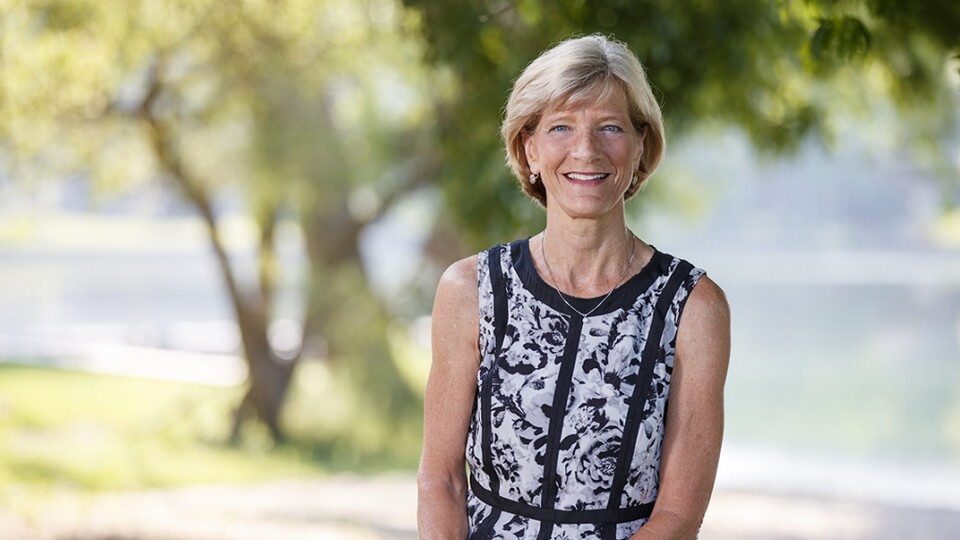Those looking to advance their leadership skills might consider taking up running. Sue Sheridan, an avid runner and director of the Nebraska Center for Research on Children, Youth, Families and Schools, has found that many lessons from the sport also apply to leadership.
Be willing to step out of your comfort zone. Set a lofty goal and stick to it. Plan. Prepare. Have a support system. Don’t be afraid of failure. Just go for it.
When Sheridan came to Nebraska from Utah as a professor of educational psychology in 1998, she set a goal to broaden her focus on early childhood development. Sheridan, the George Holmes University Professor of educational psychology, knew that collaborating with others outside her immediate field could shed light on how families, schools and communities can impact children — an intersection that had been under explored.
Sheridan said that prior to joining Nebraska 22 years ago, her research had been isolated and siloed. She’d been solely responsible for all things grant-related: from the inception of an idea, responding to an application, pulling in the necessary support for technical aspects of the application, then actually carrying it out.
“It was lonely doing research on my own. I didn’t have collaborations, nor did I have the support I needed to elevate the research,” Sheridan said. “So I went around campus and started connecting with other people. I started hanging out with my developmental friends. I started really seeking out the people I needed to learn from.”
She names the late Carolyn Pope Edwards as a primary collaborator. Edwards was a prominent psychology researcher at the university. “We were really different in our approaches and how we thought about children and education. I learned from her about a lot of basic developmental processes when it comes to early childhood education and she learned from me the importance of the family system. We created this great research relationship and friendship.”
Sheridan went on become founding director of the Nebraska Center for Research on Children,Youth, Families and Schools in 2004. Within its first year, the center established formal affiliations with 62 faculty from the university, the University of Nebraska at Omaha and the University of Nebraska Medical Center. Since then, its work has reached over 5,670 PK-12 educators worldwide and involved more than 103,000 children and families in research projects and interventions.
Widely regarded as one of the top researchers at Nebraska and nationally, Sheridan’s work has led to projects involving research sites in seven countries. Since its inception, the center has housed 243 funded research grants totaling more than $88 million.
Sheridan also serves as the director of the National Academy for Research on Rural Education, funded from 2009-2014 by the U.S. Department of Education’s Institute of Education Sciences and housed within the Center for Research on Children,Youth, Families and Schools. The center has partnered with more than 900 rural schools in Nebraska and across the U.S. She named the academy as among her proudest professional accomplishments.
“It shed a whole new light on opportunities in rural schools in ways we hadn’t done before and it just continues to grow. We don’t have the federal funding anymore, but that doesn’t stop us.”
Thomas Brock, who previously directed the institute, praised Sheridan’s record of acquiring federal funding for highly competitive and complex grant opportunities.
“Hers really have been projects of national significance,” Brock said. “This research academy on rural education, it’s about many schools in Nebraska, but it’s addressing questions of national significance, like What does it mean to be a rural school? What is rurality? From a federal government standpoint, this is a critical question — how we fund, who we choose to focus on and how it might direct funding to rural students.”
Brock also credited Sheridan’s efforts to mentor the next generation of researchers despite her many commitments. To date, more than 300 graduate and undergraduate students have engaged in Center for Research on Children,Youth, Families and Schools research and scholarly activities.
“The research is what matters most but running research projects in the way Sue does also provides opportunities for many other people, and she, in particular, has been a leader at bringing in students to contribute.”
Lisa Knoche, research associate professor in the center, has worked her entire career with Sheridan and said she admires her intentional interactions with colleagues, regardless of their role in the project. She appreciates her commitment to always “go for the gold.”
“She’s elevated social, behavioral and educational sciences as a priority. She’s continued to push and bring credibility and significance to the areas of education research, family engagement and parent-teacher connections,” Knoche said.
“Sue is such a valued member of the national research landscape. That’s what’s enabled our national-level impact — relationships with key stakeholders at the national level to fund the profile of work and to continue to disseminate the work to benefit kids most.”
Looking back at her career, Sheridan said she still considers herself a school psychologist, but that collaborating has improved the quality of her research “by 1,000 percent.” However, she admitted that it hasn’t always been easy.
“Research is hard,” Sheridan said. “The challenges we face are thorny issues in people’s lives — poverty, inequity, disability — it’s really hard work. I think people don’t acknowledge that enough, but when you think about the individual lives you touch, it’s really rewarding.”
She advises early career researchers hoping to get a running start on their own research centers to reach out to colleagues outside their own discipline and college.
“When I say reach out, I mean getting on your feet and going to other places on campus, around the country, and around the world, and seeing what researchers are doing,” Sheridan said. “Researchers are hard workers, good thinkers. Working together will make us a richer university.”






